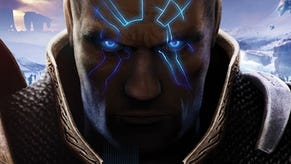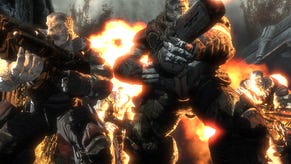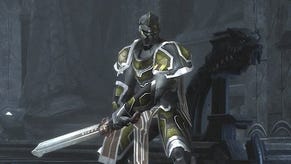GC: Next generation could see unified console - Dyack
It will "change everything".
Outspoken developer Denis Dyack outlined his vision of a one-console future in a speech at GCDC yesterday, arguing that the history of commoditization in other industries meant the standardisation of gaming hardware was an inevitability - and something we might see as soon as the next cycle of console hardware.
Dyack, president of Too Human developer Silicon Knights, believes that a "unified gaming standard" is on the horizon - and that "just like a DVD, just like a camera, everyone would know what those specs are". It's an argument Dyack has made in public before now, and with an hour of GCDC to fill he seized the opportunity to expand on what he admitted was a contentious point of view. "If you talk about commodification to a hardware manufacturer, they usually turn white," he joked.
In the future, companies like Sony, Microsoft, Toshiba, Samsung, Sharp and Dell would line up to deliver gaming systems of comparable power that supported all gaming software, Dyack predicted. In the rare case of a game that didn't work, "it would be the hardware manufacturer's fault", he said, removing a number of burdens from software developers' shoulders.
This standardisation, as he put it, would mean better hardware at lower prices, the abolition of a first-party product approval service, cheaper development due to the loss of multiple SKUs, resultant lower game prices, and a 100 percent market share for developers to target rather than a range of big fractions marked Sony, Nintendo and Microsoft, which is the current model.
Remarking that he wished he'd "gone back to back" with Stormfront's Don Daglow - because he firmly rejected the idea that the predictable console cycle Daglow identified would recur ad infinitum - Dyack said that the increased difficulty of working within the current business model was symptomatic of "performance over supply" - a strong indicator that commodification is in the offing.
"We've got a bunch of pressures that are now starting to push us to a certain direction," he said of games development. He argued that things like the rising costs of development and staffing needs, a more even split of market share between three platform holders, and the reality that a successful game needs to sell a "frightening" number of units to make back investments, meant that it was "increasingly difficult to be successful".
Equally important, he said, was how little distinction there was between PS3 and Xbox 360 graphics. "We're starting to reach a perceptual threshold where the average consumer can not tell the difference between the next-generation consoles," he argued. "I think this trend's going to continue."
Citing renowned polymath Ray Kurzweil's belief that technological growth will not slow down according to Moore's Law - the belief that the number of transistors on an integrated circuit doubles every 24 months, and that this cannot go on forever - he said other divergent technologies would take over to compensate and that gaming consoles would grow closer still in technical capacity.
But perhaps most importantly, he said, there are simply too many games. "A couple of years ago in November there were 250 games released. There's not enough consumers to play all those games," he told the room, remarking almost exasperatedly that a "normal market" would never produce a situation where Resistance: Fall of Man - Insomniac's PS3 launch shooter - and Epic Games' Gears of War for 360 were not actually competing for the same buyer.
He also challenged the belief that Nintendo Wii will continue its meteoric rise. "With the Wii adoption rate, Nintendo's come out of the gate much faster than anyone expected," he admitted. "Short term, I think everyone agrees Nintendo's doing great - long term, they might not take that bet."
Nor is he convinced that PC gaming has much life left in it. "I think the PC is the ultimate 'no standard', which is the opposite of where I think we're going," he said. "That whole market's going in circles and it's going to go nowhere...Unless there's some kind of standardisation there it's going to get worse and worse."
In a Q&A session following his talk, Dyack said that services like Xbox Live would be able to endure in this one-console future - perhaps akin to the way Blockbuster serves film and television.
Admitting that the interface for a unified console would be a sticking point, he nonetheless said he felt we were "there" with current efforts, and that changes would still be possible.
He also admitted his concern that the commoditization of film pointed to a future where developers were brought together for projects contractually, rather than given full-time positions - something he said that Silicon Knights "would fight" because it was "dehumanising".
Concluding that a one-console future - the title of his talk - was inevitable, he said that the current model would endure for as long as people could afford it, but that once developers and publishers started to find it too difficult to compete, change would occur naturally. "Next generation, you could see people agreeing on one platform," he said. "I think this model, if it occurs, will change everything."







